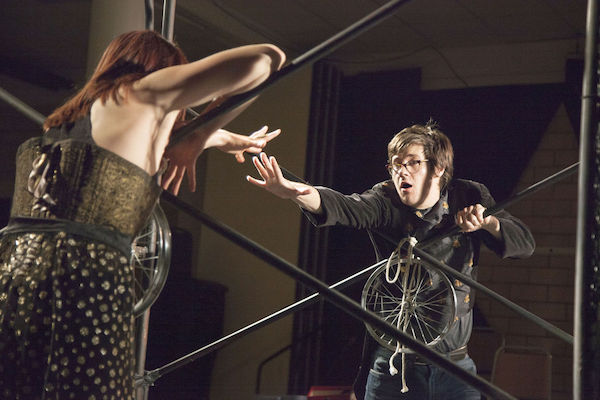
The Tenaciously curious 'Oedipus Apparatus' is part machine, part science, and an all-together compelling conundrum
By Tina Farmer
West End Players Guild closes their season with a complex and cerebral retelling of the tragedy of Oedipus. Their commissioned production Oedipus Apparatus delves into mythology and death -- what it means to humans to ponder their existence and how they feel about that final moment -- in heady fashion. In a clever twist, the fact Oedipus consciously tried to avoid his fate and is therefore blind to the truth before him is replayed and examined from differing perspectives until clarity is, presumably, achieved.
Oedipus, the brave warrior who accidentally killed his father and married his mother, fulfilling the gods' curse while calling forth a plague on the city of Thebes, is trying to end the curse on the city he now rules. The storytelling is one part the class work of daughter Antigone, one part a psychic hotline show in the free flowing conversational style of The View, and one part soap opera-esque melodrama. The equation adds up, creating a cohesive, thought provoking show.
Alicen Moser is cheerful and inquisitive as Antigone. She is creating a mechanical family tree as a class project and traces her history back to early mythology. Perpetually perky and hopeful, she is increasingly startled as she sees the story evolve. Her father Oedipus, played with a naturally overconfident swagger by Mitch Eagles, is stubborn, certain, and wrong. Mother Jocasta, a wonderfully hazy Maggie Conroy, nearly floats through her scenes, her voice a soft whisper with a languid cadence.
Will Bonfiglio is part diplomat, part playboy as Creon, and genuinely distraught. There's a sense of punctiliousness about him that is both appropriate and disarming, and he and Eagles spar with verbal precision in turns witty, defensive, and assertive. Carl Overly, Jr. as Tiresius, Ellie Schwetye as the Sphinx, Cara Barresi as Artemis, Michael Cassidy Flynn as Dr. Freud, and Rachel Tibbetts as Athena and a priestess are engagingly funny and perceptive as our psychic talk show, and Joe Taylor provides music as well as portraying Apollo. The cast is continually moving back and forward in time, almost as if Taylor's Apollo is editing a filmed version of the drama unfolding.
The dialogue shifts with each repetition, sometimes the actors speak in geometry and physics terms, other times they delve into the psychologically of dreams and the hubris of man in the face of unpleasant realities. The show demands your constant attention, enticing you to look in other corners and think about a different perspective without losing your way. Where the machine is all science, construction, and logic, the psychology is fluid, guileless, and open to interpretation.
The set, designed and built by Kristin Cassidy and Lucy Cashion, with additional show design by Joe Taylor, Jacob Francois, and Ben Lewis, is a marvel to behold. Expanding from the stage to well beyond the company's usual footprint, it consists of a giant Rube Goldberg-like machine in an almost continual state of movement or addition, bookended by Jocasta's bedroom suite and the set of the televisions show.
At times, this hodge-podge of disparate ideas -- the history project, the machine, the talk show -- feels like it's about to lose its connecting thread, but it never does, much to the delight of this reviewer. Cashion and her talented ensemble of actors and technicians appear in perfect synchronicity, expertly shifting and resetting our attention while ensuring we remain entertained in each iteration. The story of Oedipus is the constant around which all the elements balance, enabling the machine to stay on track in its ceaseless repetition.
At just under two hours without an intermission, there are likely scenes that can be shortened, and a little overall tightening might help keep the pace from occasionally lagging, but I honestly can't pinpoint the necessary cuts. The characters are interesting, a well-constructed pastiche of vaguely familiar archetypes and antagonists, each serving a specific purpose in the show. The overarching introduction at the top of the show may be a bit pretentious, but the clever premise works, creating captivating theater that stimulates your senses and intellect.
Oedipus Apparatus, running through April 30, 2017 at West End Players Guild, won't please all audiences. Some may find the long opening monologue in a dark theater a bit uncomfortable; others may feel lost in the script's mathematically driven prose. For me, mixing philosophy, science, and mathematics with questionably sourced history and a televised talk show is wickedly fabulous entertainment.


